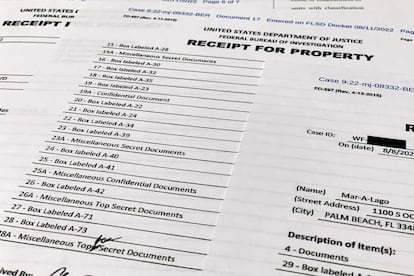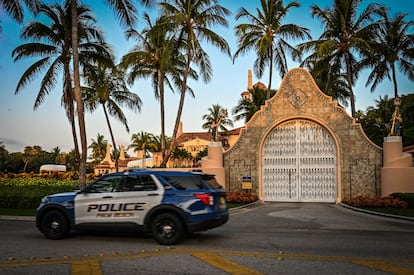These are the charges Trump faces and the jail sentences they carry
Conspiracy to obstruct justice and violations of the Espionage Act are some of the crimes the former president has been charged with, according to his legal team


Donald Trump has once again made history by becoming the first former president to be indicted on federal criminal charges in the history of the United States (no president has ever been indicted while in office). The Republican himself announced it this Thursday through his social network Truth Social, but without specifying which crimes he had been accused of. While the precise details of all the charges are not yet clear, his legal team has provided some insight into what they entail. His lawyers have spoken of seven counts, including conspiracy to obstruct justice and violations of the Espionage Act, both of which carry potentially serious prison sentences. Some of these crimes match those already being investigated in the search of Mar-a-Lago, his mansion in Palm Beach (Florida). Others were not known until now.
Jim Trusty, one of Trump’s lawyers, told CNN on Thursday night that the former president’s legal team had not yet been shown the indictment itself: “We haven’t been provided with the indictment yet. What we have right now is essentially a summons” from the Department of Justice asking the former president and his team to be at the Miami court next Tuesday at 3 p.m., he said. The court summons, however, does include some details on what the seven charges would be. “It’s not 100% clear that all of them are separate charges, but they basically break down into an Espionage Act charge, which is ludicrous under the facts of this case” and “several obstruction-based type charges and then false statement charges, which are again a crazy stretch,” said Trusty.
Is there a charge on the willful retention of classified documents? According to Trusty, yes. “We’re talking about 18 USC 793 [a section of the United States Code, a compilation of federal legislation]. And then there are several 18 USC 1512, 1519... The bottom line is that it boils down to charges of withholding [documents], as you call them, obstructions [of justice] and false statements,” he said, admitting that there is also apparently a conspiracy charge. “This is not biblically accurate, because I’m not looking at a charging document. I’m looking at a summary sheet, so there’s language in there that might actually be reflecting a single count instead of two, but I think there is a conspiracy count as well.”
Different crimes
The codes and numbers Trusty referred to were already mentioned in the search warrant for the Mar-a-Lago estate. The numbers are articles of the United States Code (USC), which is consolidation and codification by subject matter of the general and permanent laws of the country. The precepts of the Code come, therefore, from different laws passed by Congress. The articles cited are from Title 18 of the USC, which covers crimes and criminal procedures. It is equivalent to a penal code.
Section 793 has eight paragraphs ranging from (a) to (h) and is part of the Espionage Act. This section punishes, for example, those who steal U.S. secrets to deliver them to another country. Trusty has not specified which section Trump is suspected of violating, but section (d) punishes “whoever, lawfully having possession of, access to, control over, or being entrusted with any document (...) or information relating to the national defense, which information the possessor has reason to believe could be used to the injury of the United States or to the advantage of any foreign nation (...) willfully retains the same and fails to deliver it on demand to the officer or employee of the United States entitled to receive it.” That is to say, it punishes anyone who willfully withholds national security documents. For any of the paragraphs of section 793, the penalties are a fine and/or imprisonment for a maximum of 10 years
The Espionage Act was passed in 1917, during World War I, decades before the current document classification system (top secret/sensitive, top secret, secret, confidential...) existed. Therefore, even if Trump claims that he had declassified the documents, that does not automatically clear him of having committed that crime.
Obstruction of justice
Section 1519 of Title 18 of the USC, on the other hand, punishes “whoever knowingly alters, destroys, mutilates, conceals, covers up, falsifies, or makes a false entry in any record, document, or tangible object with the intent to impede, obstruct, or influence the investigation or proper administration of any matter within the jurisdiction of any department or agency of the United States,” and “it shall be fined under this title, imprisoned not more than 20 years, or both.” This violation was also mentioned in the Mar-a-Lago search warrant.
What wasn’t included in the search warrant was Section 1512 of Title 18 of the USC, which Trump’s lawyer mentioned in the CNN interview. It falls under obstruction of justice and destruction of evidence, but it is a very long section. It punishes as a crime everything from killing a witness to other less drastic ways of trying to hinder an investigation. For example, in one of its sections, it punishes with penalties of up to 20 years “whoever knowingly uses intimidation, threatens, or corruptly persuades another person, or attempts to do so, or engages in misleading conduct toward another person, with intent to (1) influence, delay, or prevent the testimony of any person in an official proceeding; (2) cause or induce any person to (A) withhold testimony, or withhold a record, document, or other object, from an official proceeding; (B) alter, destroy, mutilate, or conceal an object with intent to impair the object’s integrity or availability for use in an official proceeding; (C) evade legal process summoning that person to appear as a witness, or to produce a record, document, or other object, in an official proceeding; or (D) be absent from an official proceeding to which such person has been summoned by legal process; or (3) hinder, delay, or prevent the communication to a law enforcement officer or judge of the United States of information relating to the commission or possible commission of a Federal offense.”

Without citing the specific article, Trusty acknowledged that Trump is also charged with conspiracy. According to section 371 of Title 18 of the USC, “if two or more persons conspire either to commit any offense against the United States, or to defraud the United States, or any agency thereof in any manner or for any purpose, and one or more of such persons do any act to effect the object of the conspiracy, each shall be fined under this title or imprisoned not more than five years, or both.” The peculiarity of this crime is that it cannot be committed by Trump alone; he must have participated in the conspiracy with someone else. The former president’s lawyer has indicated that he is not aware of anyone else who is charged. The conspiracy charge also did not appear in the Mar-a-Lago search warrant.
According to his attorney, Trump also faces charges related to false statements, a crime that is regulated in section 1001 of title 18 of the USC: “Except as otherwise provided in this section, whoever, in any matter within the jurisdiction of the executive, legislative, or judicial branch of the Government of the United States, knowingly and willfully (1) falsifies, conceals, or covers up by any trick, scheme, or device a material fact; (2) makes any materially false, fictitious, or fraudulent statement or representation; or (3) makes or uses any false writing or document knowing the same to contain any materially false, fictitious, or fraudulent statement or entry; shall be fined under this title, imprisoned not more than five years.”

Although his attorneys did not mention this offense, at the time the search warrant also contained section 2071 of Title 18 of the USC. In subsection (b) it states that “whoever, having the custody of any such record, proceeding, map, book, document, paper, or other thing, willfully and unlawfully conceals, removes, mutilates, obliterates, falsifies, or destroys the same, shall be fined under this title or imprisoned not more than three years, or both; and shall forfeit his office and be disqualified from holding any office under the United States.”
It is unclear from the statements made by Trump’s lawyers whether they are referring to seven separate offenses, for each of which multiple charges may be filed, or seven counts, with a smaller number of offenses. Apparently, even they don’t know for sure, according to Trusty. We will have to wait until Tuesday to know the specific charges and much longer — perhaps even beyond the 2024 presidential election — for Trump to face a trial and to know what sentence the prosecutor asks for and what the jury verdict will be.
Sign up for our weekly newsletter to get more English-language news coverage from EL PAÍS USA Edition
Tu suscripción se está usando en otro dispositivo
¿Quieres añadir otro usuario a tu suscripción?
Si continúas leyendo en este dispositivo, no se podrá leer en el otro.
FlechaTu suscripción se está usando en otro dispositivo y solo puedes acceder a EL PAÍS desde un dispositivo a la vez.
Si quieres compartir tu cuenta, cambia tu suscripción a la modalidad Premium, así podrás añadir otro usuario. Cada uno accederá con su propia cuenta de email, lo que os permitirá personalizar vuestra experiencia en EL PAÍS.
¿Tienes una suscripción de empresa? Accede aquí para contratar más cuentas.
En el caso de no saber quién está usando tu cuenta, te recomendamos cambiar tu contraseña aquí.
Si decides continuar compartiendo tu cuenta, este mensaje se mostrará en tu dispositivo y en el de la otra persona que está usando tu cuenta de forma indefinida, afectando a tu experiencia de lectura. Puedes consultar aquí los términos y condiciones de la suscripción digital.








































